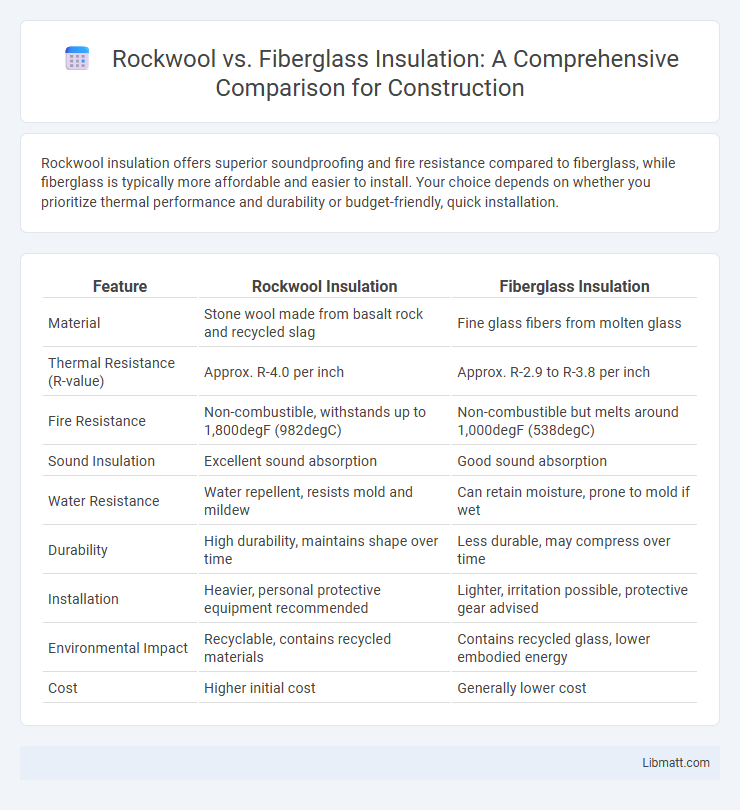Rockwool insulation offers superior soundproofing and fire resistance compared to fiberglass, while fiberglass is typically more affordable and easier to install. Your choice depends on whether you prioritize thermal performance and durability or budget-friendly, quick installation.
Table of Comparison
| Feature | Rockwool Insulation | Fiberglass Insulation |
|---|---|---|
| Material | Stone wool made from basalt rock and recycled slag | Fine glass fibers from molten glass |
| Thermal Resistance (R-value) | Approx. R-4.0 per inch | Approx. R-2.9 to R-3.8 per inch |
| Fire Resistance | Non-combustible, withstands up to 1,800degF (982degC) | Non-combustible but melts around 1,000degF (538degC) |
| Sound Insulation | Excellent sound absorption | Good sound absorption |
| Water Resistance | Water repellent, resists mold and mildew | Can retain moisture, prone to mold if wet |
| Durability | High durability, maintains shape over time | Less durable, may compress over time |
| Installation | Heavier, personal protective equipment recommended | Lighter, irritation possible, protective gear advised |
| Environmental Impact | Recyclable, contains recycled materials | Contains recycled glass, lower embodied energy |
| Cost | Higher initial cost | Generally lower cost |
Introduction to Rockwool and Fiberglass Insulation
Rockwool insulation, made from natural basalt rock and recycled steel slag, offers superior thermal resistance and excellent soundproofing compared to fiberglass insulation, which is composed of fine glass fibers spun from recycled glass and sand. Both materials provide effective energy efficiency solutions, but Rockwool excels in fire resistance and moisture durability, making it ideal for high-performance and safety-conscious applications. Understanding these differences helps you select the best insulation to optimize your building's comfort and energy savings.
Composition and Manufacturing Processes
Rockwool insulation is made from natural volcanic rock and recycled slag, melted at extremely high temperatures and spun into fibers, providing excellent thermal and acoustic properties. Fiberglass insulation consists of fine glass fibers derived from sand and recycled glass, produced by melting and blowing the molten glass into thin strands. Understanding the distinct composition and manufacturing processes can help you choose the best insulation material for your specific thermal, fire resistance, and sustainability needs.
Thermal Performance Comparison
Rockwool insulation offers a higher R-value per inch, typically around 4.0, compared to fiberglass's R-value of approximately 2.9 to 3.8, resulting in superior thermal resistance and better energy efficiency. Rockwool's dense and moisture-resistant structure minimizes heat loss and improves temperature regulation even in extreme conditions. Fiberglass insulation, while effective, tends to compress and lose insulating properties over time, making Rockwool a more durable choice for sustained thermal performance.
Soundproofing Capabilities
Rockwool insulation offers superior soundproofing capabilities due to its dense and fibrous structure, effectively absorbing and dampening airborne and impact noise. Compared to fiberglass, Rockwool provides higher sound transmission class (STC) ratings, making it ideal for reducing noise in residential and commercial settings. Its fire-resistant properties also enhance safety while maintaining acoustic performance.
Fire Resistance and Safety
Rockwool insulation offers superior fire resistance compared to fiberglass, as it is made from natural stone and can withstand temperatures up to 1,800degF, providing enhanced safety during fires. Fiberglass insulation, though non-combustible, has a lower melting point around 1,200degF, which may compromise its integrity under extreme heat. Choosing Rockwool can improve your home's fire safety due to its ability to act as a continuous fire barrier and reduce flame spread.
Moisture Resistance and Mold Prevention
Rockwool insulation offers superior moisture resistance due to its dense, non-absorbent structure that prevents water retention and inhibits mold growth. Fiberglass insulation tends to trap moisture, creating an environment conducive to mold development if not properly protected by vapor barriers. Enhanced mold prevention in Rockwool makes it a preferred choice for damp environments and areas prone to humidity.
Installation Ease and Flexibility
Rockwool offers greater installation flexibility with its denser, rigid batts that fit snugly into irregular spaces, reducing gaps and boosting thermal efficiency. Fiberglass insulation is easier to handle due to its lightweight and compressible nature, allowing quicker installation but often requiring protective gear to avoid skin irritation. Your choice between Rockwool and fiberglass will depend on whether you prioritize snug, durable fits or faster, more adaptable installation processes.
Environmental Impact and Sustainability
Rockwool insulation is made from natural volcanic rock and recycled steel slag, offering high durability and recyclability, which significantly reduces landfill waste and lowers its overall environmental footprint. Fiberglass insulation primarily consists of recycled glass and sand, but its production requires more energy-intensive processes and generates greater greenhouse gas emissions. Choosing Rockwool can enhance your home's sustainability by utilizing materials with greater thermal efficiency and a smaller ecological impact throughout their lifecycle.
Cost Differences and Value
Rockwool insulation typically costs more upfront than fiberglass, but offers superior fire resistance, soundproofing, and durability, which can enhance long-term value. Fiberglass insulation is more budget-friendly initially, making it attractive for projects with tight cost constraints, but may require replacement or additional maintenance over time. Your choice depends on balancing immediate savings versus investing in insulation that delivers increased longevity and performance.
Choosing the Right Insulation for Your Needs
Rockwool insulation offers superior fire resistance and soundproofing qualities compared to fiberglass, making it ideal for areas requiring enhanced safety and noise control. Fiberglass insulation provides a cost-effective solution with good thermal performance, suitable for general residential applications and tight budgets. Evaluating factors such as thermal resistance (R-value), moisture resistance, installation environment, and budget helps determine whether Rockwool or fiberglass insulation best meets your specific project needs.
Rockwool vs fiberglass insulation Infographic

 libmatt.com
libmatt.com